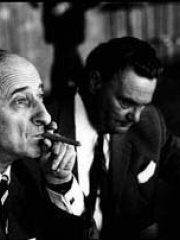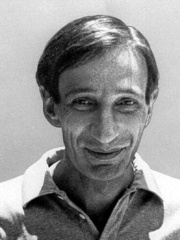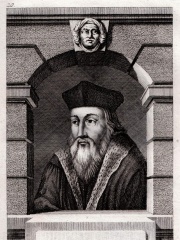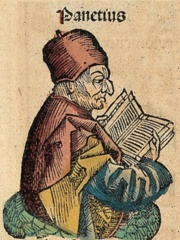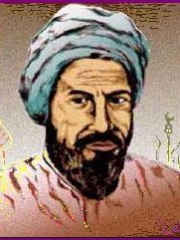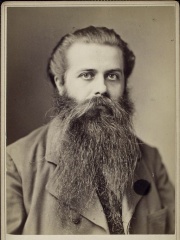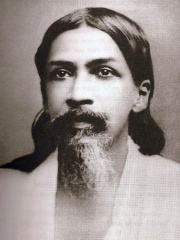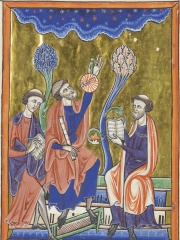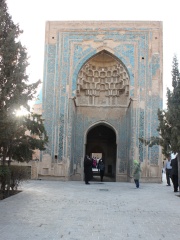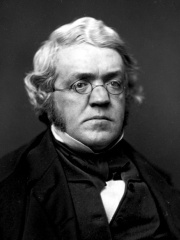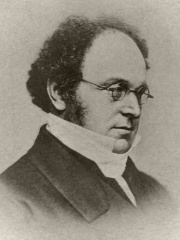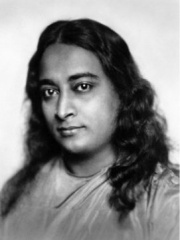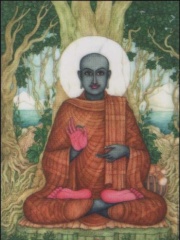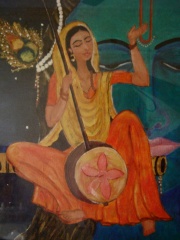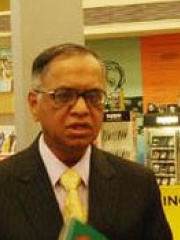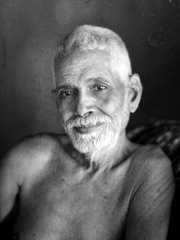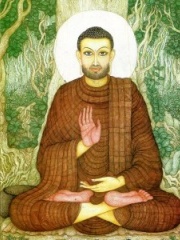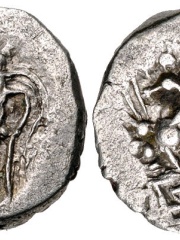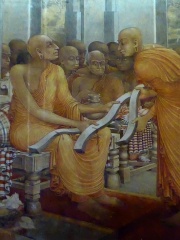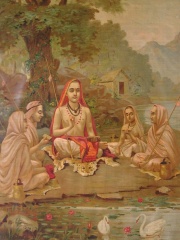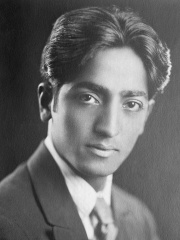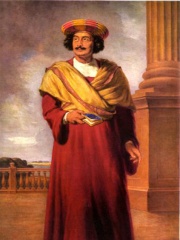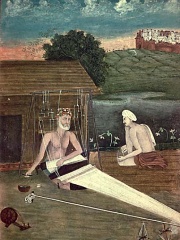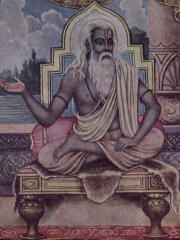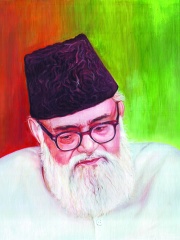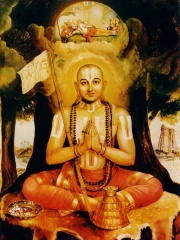PHILOSOPHER
Aśvaghoṣa
80 - 150
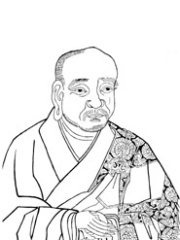
 Aśvaghoṣa
Aśvaghoṣa
Aśvaghoṣa, also transliterated Ashvaghosha (Sanskrit: [ˌɐɕʋɐˈɡʱoːʂɐ], अश्वघोष; lit. "Having a Horse-Voice"; Tibetan: སློབ་དཔོན་དཔའ་བོ།, Wylie: slob dpon dpa' bo; Chinese: 馬鳴菩薩; pinyin: Mǎmíng púsà; lit. 'Bodhisattva with a Horse-Voice') (c. 80 – c. 150 CE), was a Buddhist philosopher, dramatist, poet, musician, and orator from India. He was born in Saketa, today known as Ayodhya. Read more on Wikipedia
His biography is available in 44 different languages on Wikipedia (up from 43 in 2024). Aśvaghoṣa is the 276th most popular philosopher (down from 251st in 2024), the 95th most popular biography from India (down from 64th in 2019) and the 12th most popular Indian Philosopher.
Aśvaghoṣa is most famous for his epic poem, the Buddhacarita, which tells the story of the Buddha's life.
Memorability Metrics
Page views of Aśvaghoṣa by language
Among PHILOSOPHERS
Among philosophers, Aśvaghoṣa ranks 276 out of 1,267. Before him are Raymond Aron, Ivan Illich, Jerome of Prague, Panaetius, Ibn al-Nafis, and Karl Robert Eduard von Hartmann. After him are Andronicus of Rhodes, Ammonius Saccas, Priscus, Sri Aurobindo, Abraham ibn Ezra, and Bayazid Bastami.
Most Popular Philosophers in Wikipedia
Go to all RankingsRaymond Aron
1905 - 1983
HPI: 71.55
Rank: 270
Ivan Illich
1926 - 2002
HPI: 71.51
Rank: 271
Jerome of Prague
1379 - 1416
HPI: 71.47
Rank: 272
Panaetius
185 BC - 110 BC
HPI: 71.45
Rank: 273
Ibn al-Nafis
1212 - 1289
HPI: 71.41
Rank: 274
Karl Robert Eduard von Hartmann
1842 - 1906
HPI: 71.31
Rank: 275
Aśvaghoṣa
80 - 150
HPI: 71.30
Rank: 276
Andronicus of Rhodes
100 BC - 60 BC
HPI: 71.28
Rank: 277
Ammonius Saccas
175 - 242
HPI: 71.27
Rank: 278
Priscus
410 - 471
HPI: 71.23
Rank: 279
Sri Aurobindo
1872 - 1950
HPI: 71.21
Rank: 280
Abraham ibn Ezra
1089 - 1167
HPI: 71.20
Rank: 281
Bayazid Bastami
804 - 874
HPI: 71.16
Rank: 282
Contemporaries
Among people born in 80, Aśvaghoṣa ranks 1. Among people deceased in 150, Aśvaghoṣa ranks 1. After him are Hermas, and Liang Na.
Others Born in 80
Go to all RankingsOthers Deceased in 150
Go to all RankingsIn India
Among people born in India, Aśvaghoṣa ranks 95 out of 1,861. Before him are Jahangir (1569), William Makepeace Thackeray (1811), Priyanka Chopra (1982), Augustus De Morgan (1806), Paramahansa Yogananda (1893), and Maudgalyayana (-568). After him are Sri Aurobindo (1872), Meera (1498), N. R. Narayana Murthy (1946), Ramana Maharshi (1879), Mahākāśyapa (-550), and Harsha (590).
Others born in India
Go to all RankingsJahangir
POLITICIAN
1569 - 1627
HPI: 71.76
Rank: 89
William Makepeace Thackeray
WRITER
1811 - 1863
HPI: 71.73
Rank: 90
Priyanka Chopra
ACTOR
1982 - Present
HPI: 71.72
Rank: 91
Augustus De Morgan
MATHEMATICIAN
1806 - 1871
HPI: 71.69
Rank: 92
Paramahansa Yogananda
PHILOSOPHER
1893 - 1952
HPI: 71.62
Rank: 93
Maudgalyayana
RELIGIOUS FIGURE
568 BC - 484 BC
HPI: 71.51
Rank: 94
Aśvaghoṣa
PHILOSOPHER
80 - 150
HPI: 71.30
Rank: 95
Sri Aurobindo
PHILOSOPHER
1872 - 1950
HPI: 71.21
Rank: 96
Meera
WRITER
1498 - 1546
HPI: 71.21
Rank: 97
N. R. Narayana Murthy
BUSINESSPERSON
1946 - Present
HPI: 71.20
Rank: 98
Ramana Maharshi
PHILOSOPHER
1879 - 1950
HPI: 71.16
Rank: 99
Mahākāśyapa
RELIGIOUS FIGURE
550 BC - 549 BC
HPI: 71.13
Rank: 100
Harsha
POLITICIAN
590 - 647
HPI: 71.12
Rank: 101
Among PHILOSOPHERS In India
Among philosophers born in India, Aśvaghoṣa ranks 12. Before him are Buddhaghosa (401), Adi Shankara (788), Jiddu Krishnamurti (1895), Ram Mohan Roy (1772), Kabir (1440), and Paramahansa Yogananda (1893). After him are Sri Aurobindo (1872), Ramana Maharshi (1879), Vyasa (-390), Abul A'la Maududi (1903), Ramanuja (1017), and Chandrakirti (600).
Buddhaghosa
401 - 500
HPI: 76.08
Rank: 6
Adi Shankara
788 - 820
HPI: 75.37
Rank: 7
Jiddu Krishnamurti
1895 - 1986
HPI: 75.31
Rank: 8
Ram Mohan Roy
1772 - 1833
HPI: 75.03
Rank: 9
Kabir
1440 - 1518
HPI: 74.51
Rank: 10
Paramahansa Yogananda
1893 - 1952
HPI: 71.62
Rank: 11
Aśvaghoṣa
80 - 150
HPI: 71.30
Rank: 12
Sri Aurobindo
1872 - 1950
HPI: 71.21
Rank: 13
Ramana Maharshi
1879 - 1950
HPI: 71.16
Rank: 14
Vyasa
390 BC - 310 BC
HPI: 70.22
Rank: 15
Abul A'la Maududi
1903 - 1979
HPI: 69.30
Rank: 16
Ramanuja
1017 - 1137
HPI: 69.10
Rank: 17
Chandrakirti
600 - 650
HPI: 68.88
Rank: 18
